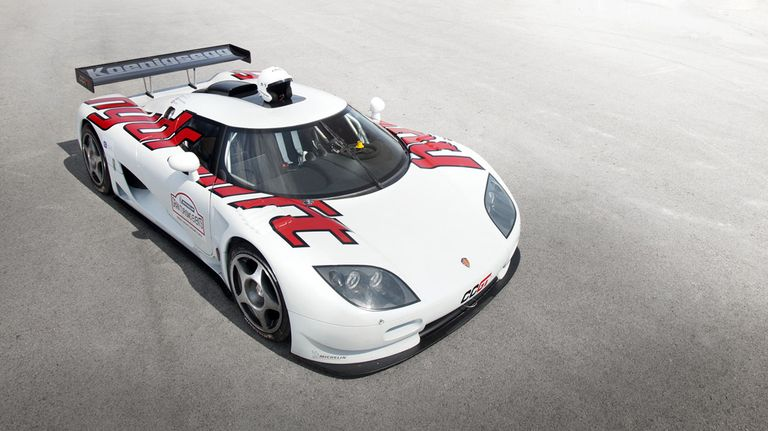Search the Community
Showing results for tags 'interviews'.
-
<Why Koenigsegg Never Went Racing, And Why It Doesn't Plan to Start Christian von Koenigsegg explains why his cars have never competed at Le Mans, and why he doesn't intend to participate in the new Hypercar class. KOENIGSEGG Despite building some of the most innovative supercars on earth, Koenigsegg does not currently have a racing team. That's not for lack of trying: Founder Christian von Koenigsegg actually built a viable race car with intent to compete at the 24 Hours of Le Mans when his company was in its infancy. But it never happened, and during a lengthy conversation with the man behind the Swedish performance car company, we learned more about why his Le Mans ambitions fell apart—and whether he hopes to try again. In 2007, Koenigsegg built a fully-functional race car that exactly followed the FIA's Group GT1 rules. The race car, called CCGT, bore a strong resemblance to Koenigsegg's second production model, the CCR. But its roots went back even further, to the very first prototype Koenigsegg built, called CC. As explained on a Koenigsegg company blog post, the original CC, and the race car it spawned, was designed to fit exactly into GT1's dimension requirements: The car could be two meters wide at the maximum, and the cockpit had to span 70 percent of the vehicle's overall width. It had a dry weight of 2200 pounds (significantly below the minimum weight for GT1, which would mean adding ballast to reach the required weight) and was powered by a naturally aspirated V-8 making well over 600 horsepower. But two months after the CCGT's first shakedown runs, the ACO and FIA had a change of heart. The governing bodies banned carbon-fiber monocoque construction, which was used in every Koenigsegg road car and thus formed the basis of the CCGT. The regulators also raised the minimum production requirement dramatically. Previously, an automaker was required to construct 20 street-legal examples of a model, in total, to be eligible to race. After the 2007 change, that number rose to 350 cars per year, impossible for a tiny automaker like Koenigsegg to achieve. The CCGT was ruled out of the class before it ever competed in a single race. The only Koenigsegg CCGT ever built. | KOENIGSEGG "We were aiming to go racing in the GT1 series, which was perfect for our type of cars—road-going hypercars turned race cars" von Koenigsegg told Road & Track during a recent, lengthy conversation. "Then they shut it down right when we were about to go racing, which was very annoying. Since then, there hasn't been any series for these types of cars." The rule change left von Koenigsegg without a place to take his supercars racing. "Even if we would be allowed to go to the highest level of GT racing, we would be competing against Porsche 911s and Ferrari 488s"—sports cars built to vastly different performance goals than Koenigsegg's cars, which commanded well over half a million dollars each. Even if von Koenigsegg had wanted to compete in such a class, he worried that his cars would be "completely downgraded through Balance of Performance via restrictors, because we are not supposed to be any faster. And then it would be just a super-expensive racing car, which would cost more to repair than a 911, and we might even get beaten by a 911 because of BoP, while in reality, they are completely different vehicles. That doesn't make any sense." So Koenigsegg's racing dreams died in 2007, before they could ever become real. But what about today? The WEC's new Hypercar class debuted this year, and it was seemingly built for exactly the kind of extreme vehicles that Koenigsegg builds. But the man behind the Swedish supercar company is unconvinced. "Of course, they started this Hypercar series at Le Mans, but in the end it turned out to be some kind of LMP car again, so it's just a new name for the same kind of thing, more or less." Does von Koenigsegg see a racing future for his cars? Not under the current rules. "The alternative, I guess, is to build some kind of a Le Mans Prototype, which has no relation to our road cars, which I don't find too appealing. I would like to go back to the GT1 type of class, where we [could] see Bugattis, Paganis, Koenigseggs—modified road cars featuring completely different technologies. Not this silhouette racing where you have the same chassis under different bodies. Granted, it would be a very expensive series, given the price of these cars, but then we could build up on what we have. Everyone could showcase something you could actually buy, if you're extremely wealthy. That's what we would like, but I'm not sure if it could ever happen.">
- 3 replies
-
- 2
-

-
- koenigsegg
- ccgt
-
(and 27 more)
Tagged with:
- koenigsegg
- ccgt
- ccr
- fia
- gt1
- le mans
- prototype
- racing
- motorsport
- aco
- wec
- homologation
- limited production
- endurance
- 24 hours
- silhouette
- race cars
- balance of performance
- bop
- federation internationale de lautomobile
- automobile club de louest
- world endurance championship
- supercars
- hypercars
- sports cars
- lmp1
- lmh
- interviews
- christian von koenigsegg
-
Hi I have a question. How many interviews do you have to go through b4 getting the job. I'm speaking in general terms. I'm applying for an Engineer job, and i've gone through the 1st interview. I'm going for a 2nd interview this week. Normally what questions will they ask on the 2nd interview. Any advice would be great. Cheers
- 75 replies
-
- many
- interviews
-
(and 1 more)
Tagged with:
-
How huh??? Please dun tell me to resign 1st then find job...
- 45 replies
-
- interviews
- while
-
(and 1 more)
Tagged with:
-
CNBC special interview with Takeo Fukui, CEO of Honda Motor in "Managing Asia" was first telecast at 6.30pm yesterday Repeat broadcast, according to CNBC website: Today, Sat (19 July): 8pm Sunday (20 July): 2am, 7am, 11am, 6pm & 9pm Monday (21 July): 4am Includes subjects like advanced hydrogen-powered fuel cell cars & new hybrid cars, and workings of Honda's famous engineering unit. Don't miss the Honda Motor's story on this week's "Managing Asia" -- only on CNBC!. Should be interesting.
- 3 replies
-
- CNBC
- interviews
- (and 4 more)
-
here r the views of real hardcore street racers from japan, from why they do what they do on the wangan expressway to cops to the $ spent... http://video.google.com/videoplay?docid=-8...earch&plindex=5





